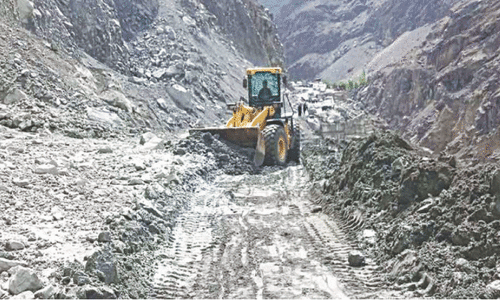HYDERABAD, Sept 18: The Sindh Abadgar Board (SAB) claimed on Monday that the recent heavy rains had inflicted over Rs37 billion losses on the farmers and appealed to the government to ensure transparency in the survey of losses by involving the stakeholders in the process.
In a letter to the prime minister, SAB President Abdul Majeed Nizamani said that the recent rains were the worst in 30 years, which wreaked havoc in lower Sindh in the absence of a proper drainage system.
He pointed out that the rains destroyed 40 per cent of cotton crop, 22 per cent of sugarcane, 90 per cent of chillies, 95 per cent of tomatoes, 100 per cent of melons, 20 per cent of fodder, 52 per cent of onions, 23 per cent of paddy and 30 per cent of other crops including nurseries.
The calamity completely wiped out all the crops in katcha area, he said adding that the rice export this year would be 200,000 tons less fetching only 50 million dollars.
Mr Nizamani said that 90 per cent of Sanghar, Mirpurkhas, Umerkot, Badin and katcha area were destroyed while Tando Muhammad Khan, Tando Allahyar, Matiari, Hyderabad (rural), Thatta and Nawabshah were partially affected except some talukas where the losses were in the range of 40 to 60 per cent.
He said that the farmers had also suffered huge losses in livestock and infrastructure and appealed to the prime minister to exempt them from all the levies including land tax, water charges, drainage cess and local cess.
He demanded that the private and public sector banks grant complete and unconditional remission to the farmers with regard to agriculture loans and extend to them interest free loans for Rabi crops.
Mr Nizamani feared that if the government did not handle the situation in a proper manner, the rural population would have to suffer during Kharif season and it would not be able to shake off its bad affects for many years to come.
He suggested that the growers in the rain-hit areas be given wheat seed and fertilizers free of cost to enable them to sow the crop in the coming season.
He urged the departments concerned to maintain the LBOD properly and rehabilitate the infrastructure and drainage system without any delay.
SCA: The president of Sindh Chamber of Agriculture (SCA), Syed Qamaruzzaman Shah, has warned that it is impossible to start crushing season before Eidul Fitr as the sugarcane fields are still inundated.
Addressing the chamber’s weekly meeting on Sunday he said that if rainwater was not drained out in time, it would be extremely difficult for the farmers to sow wheat.
He pointed out that sugar used to be the main product of sugarcane but with the passage of time its importance had been reduced to a by-product. At present, ethanol, alcohol and chipboard were also being made from sugarcane, he said.
Brazil, the world’s number one sugarcane producer, now produced ethanol from sugarcane and 100 per cent of its vehicles were running on the bio-fuel, he said.
The phenomenon had increased the importance of sugarcane manifold and its price therefore should also be raised accordingly, he suggested.













































